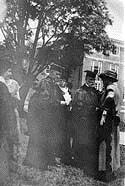By Hannah Merseal
It is interesting how close everything is in New England. As a former Midwesterner, I am used to travelling across large stretches of empty land and entering towns where nobody knows anything about me. That all changed when I moved to Vermont, where I regularly run into distant relatives and towns named after my ancestors (shout-out to Amsden, Vt.). I now attend Wheaton College in Massachusetts where I study music and psychology. I came back home for the summer to intern with the Calvin Coolidge Presidential Foundation. Connections ensued.
Wheaton College is a small, private liberal arts college located in Norton, Massachusetts. A vibrant community full of students from all different backgrounds, Wheaton began as a women’s seminary in 1834 and was chartered as a four-year college in 1912. Recently, the Marion B. Gebbie archive at Wheaton dug up some newspaper clippings from 1923 when Vice President Calvin Coolidge gave the college’s commencement address, only a few months before becoming president upon the death of Warren Harding. Coolidge was honored by Wheaton with an honorary Doctor of Laws degree. Of course honorary degrees are often presented to commencement speakers, particularly
ones of Coolidge’s stature. Yet, this particular honorary Doctor of Laws degree held special significance: Coolidge was the first man to receive any degree from the College, 65 years before Wheaton became co-educational in 1988.
In his speech, Coolidge asked the young women in front of him to become leaders: As the Northampton Gazette reports, Coolidge remarked that since universal education “could not be realized for a considerable length of time”, the “old necessary duty of service and leadership” would be the duty of “those who have been fortunate enough to secure the advantages of the higher institutions of learning.” Of course, many Wheaton graduates have gone on to be influential leaders. Notable alumni include Christine Todd Whitman, Jigme Khesar Namgyel Wangchuck, Lesley Stahl, Ellen Moran, and former executive director of the Calvin Coolidge Memorial Foundation Cynthia Bittinger.

In the conclusion of his speech, Coolidge spoke of the fundamental role a liberal arts
education plays in the development and perpetuation of the character of America:
“We do not need more material development, we need more spiritual development. We do not need more intellectual power, we need more moral power. We do not need more knowledge, we need more character. We do not need more government, we need more culture. We do not need more law, we need more religion. We do not need more of the things that are seen, we need more of the things that are unseen… The success or failure of liberal education, the justification of its protection and encouragement by the government, and of its support by society, will be measured by its ability to minister to this great cause, to perform the necessary sacrifices, to make the required redeeming sacrifices.”
This excerpt succinctly detailed Coolidge’s beliefs as expressed throughout his presidency – restrained government, moralism, and faith in the American people to move the country into modernity. It is clear that even in the few months before the presidency was thrust into his hands, Coolidge had already developed a strong governing philosophy that would aid him later as president. Meanwhile, Wheaton College continues in its long-held tradition as a haven where abstract thinkers and good people come to learn and be trained in the liberal arts.
[1] Wheaton College (MA); http://www.wheatoncollege.edu
[2] Marion B. Gebbie Archives Facebook page, July 20, 2016; https://www.facebook.com/GebbieArchives/posts/491936967665133:0
[3] Wheaton College History, Calvin Coolidge Speaks at Commencement; http://wheatoncollege.edu/college-history/1920s/calvin-coolidge/
[4] Arthur F. Fleser, A Rhetorical Study of the Speaking of Calvin Coolidge, Edwin Mellen Press, 1990, p. 57.